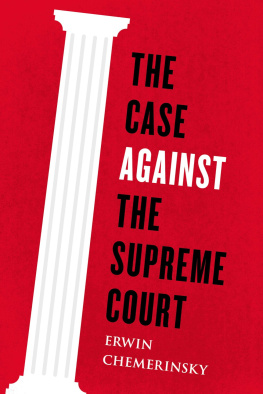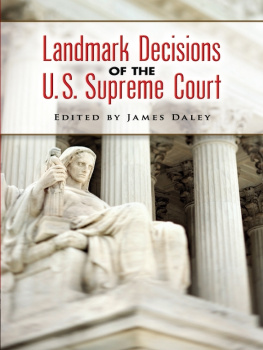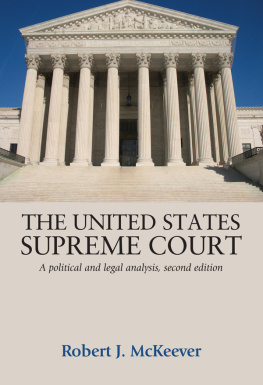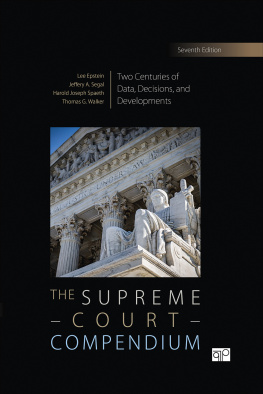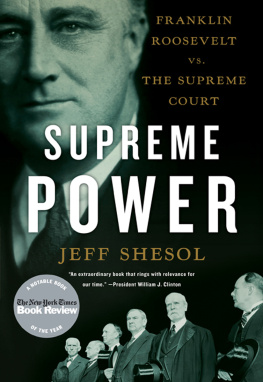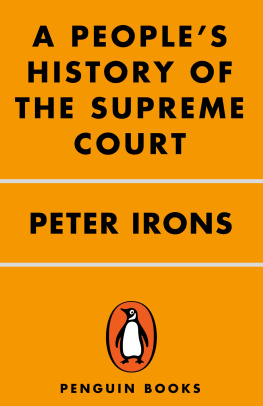USA | Canada | UK | Ireland | Australia | New Zealand | India | South Africa | China
Penguin supports copyright. Copyright fuels creativity, encourages diverse voices, promotes free speech, and creates a vibrant culture. Thank you for buying an authorized edition of this book and for complying with copyright laws by not reproducing, scanning, or distributing any part of it in any form without permission. You are supporting writers and allowing Penguin to continue to publish books for every reader.
Chemerinsky, Erwin, author.
The case against the Supreme Court / Erwin Chemerinsky.
p. cm.
Includes bibliographical references and index.
1. United States. Supreme Court. 2. Judicial reviewUnited States. I. Title.
Introduction: Assessing the Supreme Court
C arrie Buck was born in 1906 in Charlottesville, Virginia. She was the first of three children born to Emma Buck. Frederick Buck was Carries father, but he left Emma soon after their wedding. Unable to afford to care for Carrie, Emma placed her with foster parents, J. T. and Alice Dobbs. Carrie went through the sixth grade at the local public school and by all accounts was a normal child. At age seventeen, while Carrie was still living with her foster parents and helping out with chores around their house, she was raped by a nephew of her foster parents and became pregnant.
The Dobbs blamed Carrie for the pregnancy and were shamed by it. On January 23, 1924, they involuntarily committed Carrie to the Virginia State Colony for Epileptics and Feeble-Minded. A few months later, on March 28, Carrie gave birth there to a daughter, Vivian. The State of Virginia immediately took Vivian away from Carrie and put her in the care of Carries foster parents, who ultimately adopted Vivian. As if this story were not tragic enough, the state then sought to have Carrie surgically sterilized by tubal ligation.
Virginia had a new eugenics law that authorized the involuntary surgical sterilization of those deemed to be of low intelligence. Virginia was not alone. By the 1930s, more than thirty states had laws that allowed for the involuntary sterilization of criminals, those of low intelligence, and those with so-called hereditary defects, including alcoholism and drug addiction in some states and even blindness and deafness in others.
A hearing was held before Carrie Bucks sterilization. Harry Laughlin, the drafter of many of these eugenics laws, provided a deposition in Carries case. He began his family history of the Bucks by writing, These people belong to the shiftless, ignorant and worthless class of anti-social whites of the South. Laughlin stated that Carrie and Emma were feeble-minded, as determined by the Stanford-Binet intelligence test, which had recently been created. Carrie, he said, scored a mental age of nine years; Emma, her mother, seven years and eleven months.
Laughlin said that most feeblemindedness is inherited, and Carrie Buck fit this pattern. Generally feeble-mindedness is caused by the inheritance of degenerate qualities; but sometimes it might be caused by environmental factors which are not hereditary, he said. In the case given, the evidence points strongly toward the feeble-mindedness and moral delinquency of Carrie Buck being due, primarily, to inheritance and not to environment.
A social worker, Caroline Wilhelm, testified that Carries daughter, Vivian, was mentally retarded. At the time of the hearing, Vivian was seven months old. Wilhelm said that there is a look about it that is not quite normal, but just what it is, I cant tell. She said that the baby seemed apathetic. She then urged Carrie Bucks sterilization: I think, she said, it would at least prevent the propagation of her kind.
We now know that neither Carrie nor Vivian Buck was mentally retarded. Many years later, professor Paul Lombardo found Carrie Buck and wrote: As for Carrie, when I met her she was reading newspapers daily and joining a more literate friend to assist at regular bouts with the crossword puzzles. She was not a sophisticated woman, and lacked social graces, but mental health professionals who examined her in later life confirmed my impressions that she was neither mentally ill nor retarded.
Vivian Buck died at the age of eight, from enteric colitis. Harvard professor Stephen Jay Gould tracked down her records and found that at the Venable Public Elementary School of Charlottesville, which she attended for four termsfrom September 1930 to May 1932, a month before her deathshe received passing grades in every subject.
Carrie Bucks sister, Doris, also was surgically sterilized without her consent. Doris was told that she was having an appendectomy, but instead a tubal ligation was performed on her. It was not until 1980 that Doris learned what had been done to her. She, too, was of normal intelligence.
The United States, of course, was not alone in performing surgical sterilizationsvasectomies for men and tubal ligations for womenon those who were deemed unfit. Before World War II, Nazi Germany subjected 375,000 people to forced sterilizationmost for congenital feebleness, but at least four thousand for being deaf or blind.
But isnt the United States different, because we have a Constitution that protects individual liberties and we have a Supreme Court to enforce it? Carrie Bucks case made it all the way to the Supreme Court in a lawsuit with the doctor who performed the operation, John Bell. A guardian for Buck, R. G. Shelton, filed the case on her behalf and challenged the constitutionality of the Virginia law that authorized involuntary sterilizations. Bucks attorney, Irving Whitehead, argued that her fundamental rights had been violated by surgically sterilizing her without her consent and that forced sterilization was cruel and unusual punishment. After all, Carrie Buck had committed no crime and had done nothing wrong. She was involuntarily institutionalized by her foster parents after she was raped. Bucks case was the vehicle for challenging state eugenics laws that were being used to surgically sterilize the unfit all across the country.
But the Supreme Court, in Buck v. Bell, in 1927, ruled against her by an 81 margin. None other than the eminent Justice Oliver Wendell Holmes Jr. regarded as one of the greatest jurists in American history, wrote the opinion for the Court against her. Before being appointed to the Supreme Court in 1902, Holmes had fought in the Civil War, been a professor at Harvard Law School, and served as a justice and chief justice of the Massachusetts Supreme Judicial Court. He served for thirty years on the United States Supreme Court before retiring at age ninety. His opinions in many areas, such as those arguing in favor of protection of freedom of speech, are among the most revered in American history.

